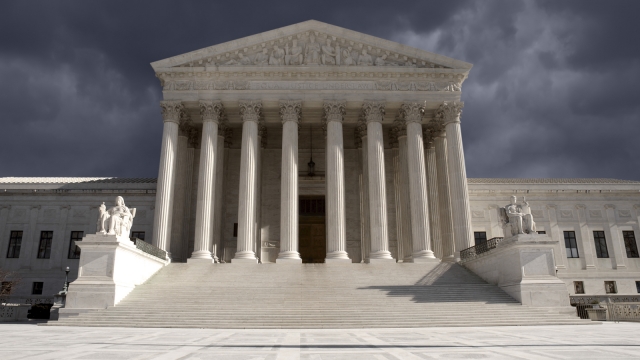Narrow Scope of SCOTUS Ruling in Masterpiece Cakeshop Case Does Not Change Civil Rights Laws

Today, HRC released the following statement following the decision from the Supreme Court of the United States in the case of Masterpiece Cakeshop v. Colorado Civil Rights Commission.
The Supreme Court has ruled that the state of Colorado’s enforcement of its civil rights law was flawed, while reaffirming that LGBTQ Americans should not face discrimination in the provision of goods and services and state law may continue to prohibit such discrimination.
“In today’s narrow ruling against the Colorado Civil Rights Commission, the Supreme Court acknowledged that LGBTQ people are equal and have a right to live free from the indignity of discrimination,” said HRC President Chad Griffin. “Anti-LGBTQ extremists did not win the sweeping ‘license to discriminate’ they have been hoping for — and today’s ruling does not change our nation’s longstanding civil rights laws. Yet, the fact remains that LGBTQ people face alarming levels of discrimination all across the country and HRC’s efforts to advance equality are as urgent as ever. With LGBTQ people at risk of being fired, evicted or denied services in 31 states, HRC continues to build momentum for the Equality Act, to elect pro-equality candidates up and down the ballot, and to fight in every corner of our country to advance policies that protect LGBTQ people from being targeted for who they are or whom they love.”
With our allies, HRC will continue to fight against discrimination in all its forms — in communities across the country, at the ballot box, and in court. This year, HRC will continue to push to elect a pro-equality Congress and to work toward ensuring lasting, legal protections for the LGBTQ community. In addition, HRC will continue to push for the passage of the federal Equality Act. The bipartisan Equality Act would provide clear and consistent non-discrimination protections on the basis of sexual orientation and gender identity across key areas of life, including employment, housing, federally-funded programs, public spaces and services, education, credit, and jury service.
The Masterpiece Cakeshop case involves a baker who refused to serve a gay couple in violation of Colorado’s statewide non-discrimination law. Represented by the SPLC-designated hate group Alliance Defending Freedom, the baker — who lost before the Colorado Supreme Court — claimed that he should be able to discriminate against LGBTQ people on religious freedom and freedom of speech grounds. The Trump-Pence Administration filed an amicus brief in this case in support of the baker’s claim.
HRC organized two major amicus briefs in the case featuring the nation’s leading bakers, chefs, and restaurateurs; as well as top businesses who oppose discrimination against LGBTQ people. The first brief inspired by “Chefs for Equality” included more than 240 bakers, chefs, restaurateurs, and other culinary industry leaders from all 50 states, plus Washington, DC. They joined together to relay a very simple message: businesses must welcome all. If a business is open on main street, it must be open to everyone, regardless of who they are or whom they love. Backed by food professionals from Orlando, FL, to Seattle, WA, and Dallas, TX, to Philadelphia, PA, the brief was also signed by some of the most prominent names in the culinary industry, including Elizabeth Falkner, Jose Andres, Sophie LaMontagne and Katherine Berman of Georgetown Cupcake, Carla Hall, Padma Lakshmi, Christina Tosi, Anthony Bourdain, Tom Colicchio, Duff Goldman, Sam Kass, and many more. The brief was authored by Akin Gump Strauss Hauer & Feld LLP, an international law firm headquartered in Washington, DC.
Additionally, dozens of major corporations spoke out in another HRC-led amicus brief. These companies sent a powerful message to the Supreme Court, as well as LGBTQ people and allies across the nation. With one voice, they made clear that a business owner’s personal beliefs should never be reason enough to discriminate against a customer because of who they are or whom they love. The business brief was authored by Steptoe & Johnson LLP, an international law firm headquartered in Washington, DC, and was signed by major corporations from a diverse spectrum of industries, from Apple and Intel to Levi’s and Mass Mutual. The full list of signatories includes Affirm, Inc.; Airbnb, Inc.; Amalgamated Bank; Amazon.com, Inc.; American Airlines; Apple; Ben & Jerry’s Homemade Inc.; Choice Hotels International, Inc., International; Cisco Systems, Inc.; Citigroup Inc.; Deutsche Bank; Glassdoor, Inc.; Intel Corporation; John Hancock; Levi Strauss & Co.; Linden Research, Inc.; Lyft Inc.; Marriott International, Inc.; MassMutual; Mitchell Gold + Bob Williams; MongoDB, Inc.; National Gay & Lesbian Chamber of Commerce; NIO U.S.; PayPal Holdings, Inc.; Pfizer Inc; Postmates Inc; PricewaterhouseCoopers LLP; Prudential Financial, Inc.; Replacements, Ltd.; salesforce.com, inc.; SurveyMonkey; The Estée Lauder Companies Inc.; Uber Technologies, Inc.; WeddingWire, Inc.; Weebly, Inc.; Witeck Communications; and Yelp Inc.
www.hrc.org/blog/narrow-scope-of-scotus-ruling-in-masterpiece-cakeshop-case-does-not-change?utm_source=rss&utm_medium=rss-feed

![Mad' - Pride FaceTattoo [GIFT POSTER]](https://farm2.staticflickr.com/1748/42568682331_aa6c35a181_m.jpg)







